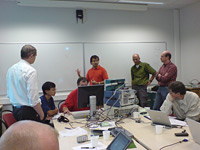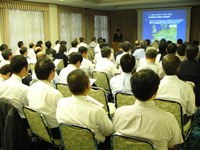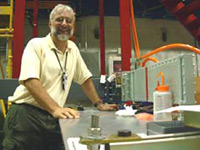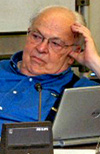Virtually There - The Control Room of the Future?

A real team working on virtual revolutions: the GANMVL collaboration at a workshop at DESY. |
Imagine the ILC is up and running. Electrons and positrons collide happily and scientists are taking data. Suddenly there's a problem with one of the laser wires. All experts are at a meeting on a different continent, but the problem needs to be fixed immediately. Difficult? Not when there's a Multipurpose Virtual Lab in place. High-speed, high-resolution cameras would allow the faraway experts to look at the fault, a web-based portal would let them access the controls and tools of the system with a simple "single-sign-on" procedure. And if you think this is far-fetched, think again: the first prototype was tested during the last week of August. And it works!
Read more...
-- Barbara Warmbein
|
|
 |
Linear Collider Forum of Japan Meets

Takashi Kato reporting on his visit to the Gotthard-Basistunnel. |
The Linear Collider Forum of Japan is a joint group of physicists, engineers and industry. Their objectives are to explore the technical, economical and political aspects of the International Linear Collider as an international endeavour, to study the roles of the academic and industrial sector, make recommendations for research and development and to develop a feasible scenario for building the ILC. They also study the regional infrastructure, which is necessary to host the ILC and make recommendations for operating an international research institute. They hold meetings twice a year, and 84 people attended the meeting on 11 September at Gakushikai Annex, near the University of Tokyo.
Read more...
-- Youhei Morita
|
 |
|
|
 |
From SLAC Today: Experimental Work at SLAC Brings RF Design Effort to Life

Richard Swent |
Rich Swent parts the thick plastic strips hanging from the doorframe and enters End Station B. He heads through the cavernous room, past spools of cables and under foot-thick cooling pipes, coming to a stop at a table. Currently cluttered with squirt bottles and tools, the aluminum surface will soon serve as the test stand for cutting-edge components made by SLAC for the International Linear Collider (ILC).
End Station B these days is the site of the largest ILC R&D effort at SLAC, the development of the L-band (1.3 GHz) radio frequency (RF) power source. This includes everything between the wall plug and the superconducting RF cavities: the modulators, klystrons, RF distribution, and fundamental mode couplers.
Chris Adolphsen is the scientific leader of this critical R&D effort. Chris has led the development of high power RF systems for the last decade, working first on the X-band normal conducting design and, more recently, on the L-band superconducting design.
Read more...
-- Krista Zala
SLAC Today, September 20, 2006
|
|
 |
Machine Advisory Committee Reviews the GDE

Nobel Laureate Burt Richter, a prominent MAC member |
The Machine Advisory Committee (MAC) reviewed the GDE for the second time last week at KEK in Japan from 20 to 22 September. The MAC, appointed by the International Linear Collider Steering Committee, is made up of an experienced international group of accelerator experts. The first review was held at Fermilab last spring and served to introduce the committee to the GDE. This time, the review looked more deeply into specific areas of our efforts. Today, I highlight some of the key observations and recommendations of the committee, based on what we were told during the closeout session for this review. The complete report should be issued within a few weeks.
Read more...
-- Barry Barish
Director's Corner Archive |
 |
|
|
 |
Register for ILC-Valencia '06
ILC-ECFA and the GDE will host a joint meeting in Valencia, Spain on 6-10 November 2006. The registration deadline is on 6 October.
To register...
ILC-Related Preprints
hep-ph/0609247
25 Sep 2006
Effects of the littlest Higgs model with T-parity on Higgs boson production at high energy e+ e- colliders
hep-ph/0609208
22 Sep 2006
Higgs boson pair production process e+ e- -> ZHH in the littlest Higgs model at the ILC
SLAC-PUB-12116
Sep 2006
Undulator Background in the Final Focus Test Beam Experiment with Polarized Positrons
|
 |
|
|
 |
From the American Institue of Physics
25 September 2006
Responses to Survey of Women in Physics
"A 2005 survey of women working in physics around the world found that most would choose a physics career all over again..."
Read more... |
|
From The University of Chicago Chronicle
25 September 2006
Physicists on faculty support ILC construction
"Two beams of subatomic particles, each measuring far less than the diameter of a human hair, travel at the speed of light from opposite ends of an 18-plus-miles- long track. In precise alignment, they smash head-on into each other..."
Read more... |
|
Berkeley Lab Press Release
25 September 2006
From Zero to a Billion Electron Volts in 3.3 Centimeters
Highest Energies Yet From Laser Wakefield Acceleration
"..scientists at the Department of Energy's Lawrence Berkeley National Laboratory, working with colleagues at the University of Oxford, have accelerated electron beams to energies exceeding a billion electron volts (1 GeV) in a distance of just 3.3 centimeters..."
Read more... |
|
|

